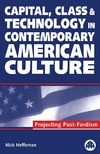Postmodernism and postmodernity have become key terms through which contemporary cultural change is theorized. In this original and stimulating study, Nick Heffernan demonstrates that the postmodern is not only a cultural matter: it bears on the transformations wrought by and within contemporary capitalism itself. To ask the postmodern question, according to Heffernan, is necessarily to inquire into the nature of Western capitalist societies as they have developed in the second half of the twentieth century, and in the process to engage in a series of complex meditations on capital, class, and technology.
In a stimulating reading of the relationship between cultural forms of social, economic, and political change in postwar America, Heffernan uses a range of cultural texts — film, literature, reportage — to illuminate the processes and modes by which crisis and social, economic, and cultural changes are registered. Using the links between narrative cultural forms and the process of historical understanding, he brings together debates that have so far been conducted largely within the separate domains of political economy, social theory, and cultural criticism to provide a compelling analysis of contemporary cultural change. By relocating postmodernism in the context of changing modes of capitalism, Heffernan puts the question of class and class agency back at the center of the critical agenda.
 |
|
О проекте
|
|
О проекте


